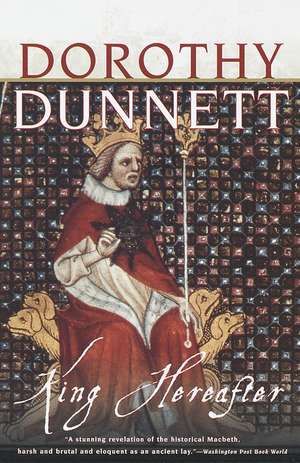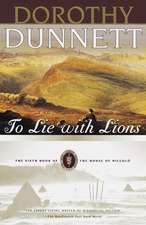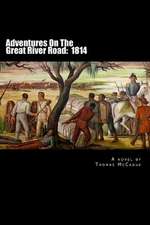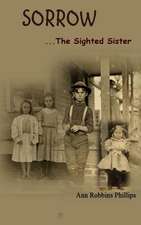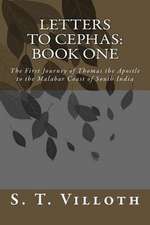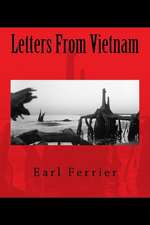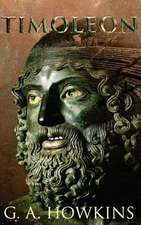King Hereafter
Autor Dorothy Dunnetten Limba Engleză Paperback – 31 aug 1998
With the same meticulous scholarship and narrative legerdemain she brought to her hugely popular Lymond Chronicles, our foremost historical novelist travels further into the past. In King Hereafter, Dorothy Dunnett's stage is the wild, half-pagan country of eleventh-century Scotland. Her hero is an ungainly young earl with a lowering brow and a taste for intrigue. He calls himself Thorfinn but his Christian name is Macbeth.
Dunnett depicts Macbeth's transformation from an angry boy who refuses to accept his meager share of the Orkney Islands to a suavely accomplished warrior who seizes an empire with the help of a wife as shrewd and valiant as himself. She creates characters who are at once wholly creatures of another time yet always recognizable--and she does so with such realism and immediacy that she once more elevates historical fiction into high art.
| Toate formatele și edițiile | Preț | Express |
|---|---|---|
| Paperback (2) | 85.16 lei 24-35 zile | +37.66 lei 4-10 zile |
| Penguin Books – 18 oct 2017 | 85.16 lei 24-35 zile | +37.66 lei 4-10 zile |
| Vintage Books USA – 31 aug 1998 | 132.04 lei 3-5 săpt. |
Preț: 132.04 lei
Nou
Puncte Express: 198
Preț estimativ în valută:
25.26€ • 26.38$ • 20.86£
25.26€ • 26.38$ • 20.86£
Carte disponibilă
Livrare economică 25 martie-08 aprilie
Preluare comenzi: 021 569.72.76
Specificații
ISBN-13: 9780375704031
ISBN-10: 0375704035
Pagini: 736
Dimensiuni: 130 x 203 x 30 mm
Greutate: 0.57 kg
Ediția:Vintage Books.
Editura: Vintage Books USA
ISBN-10: 0375704035
Pagini: 736
Dimensiuni: 130 x 203 x 30 mm
Greutate: 0.57 kg
Ediția:Vintage Books.
Editura: Vintage Books USA
Notă biografică
Dorothy Dunnett was born in 1923 in Dunfermline, Fife, Scotland. Her time at Gillespie's High School for Girls overlapped with that of the novelist Muriel Spark. From 1940-1955, she worked for the Civil Service as a press officer. In 1946, she married Alastair Dunnett, later editor of The Scotsman.
Dunnett started writing in the late 1950s. Her first novel, The Game of Kings, was published in the United States in 1961, and in the United Kingdom the year after. She published 22 books in total, including the six-part Lymond Chronicles and the eight-part Niccolo Series, and co-authored another volume with her husband. Also an accomplished professional portrait painter, Dunnett exhibited at the Royal Scottish Academy on many occasions and had portraits commissioned by a number of prominent public figures in Scotland.
She also led a busy life in public service, as a member of the Board of Trustees of the National Library of Scotland, a Trustee of the Scottish National War Memorial, and Director of the Edinburgh Book Festival. She served on numerous cultural committees, and was a Fellow of the Royal Society of Arts. In 1992 she was awarded the Office of the British Empire for services to literature. She died on November 9, 2001, at the age of 78.
Dunnett started writing in the late 1950s. Her first novel, The Game of Kings, was published in the United States in 1961, and in the United Kingdom the year after. She published 22 books in total, including the six-part Lymond Chronicles and the eight-part Niccolo Series, and co-authored another volume with her husband. Also an accomplished professional portrait painter, Dunnett exhibited at the Royal Scottish Academy on many occasions and had portraits commissioned by a number of prominent public figures in Scotland.
She also led a busy life in public service, as a member of the Board of Trustees of the National Library of Scotland, a Trustee of the Scottish National War Memorial, and Director of the Edinburgh Book Festival. She served on numerous cultural committees, and was a Fellow of the Royal Society of Arts. In 1992 she was awarded the Office of the British Empire for services to literature. She died on November 9, 2001, at the age of 78.
Extras
ONE
When the year one thousand came, Thorkel Amundason was five years old, and hardly noticed how frightened everyone was. By the time Canute ruled England, Thorkel was nineteen and had heard as much about the old scare as he wanted, from the naked lips of men who might be able to read and to write, but who wouldn't know one end of a longship from the other.
He understood that folk had thought the Day of Judgement was coming, because a thousand years had passed since the White Christ was born, in that age when the Romans had conquered the world.
All the world, that is, except for the north.
The Romans had not conquered Denmark, or Norway, or Sweden. They had not conquered Ireland, or his own Orkney islands, or Iceland to his north. They had overcome England, beginning in the toe and pushing north until they stuck on the border of Alba and built their frontier wall there, stretching from sea to sea.
The barbarians who followed the Romans had learned all about the White Christ by the time that Charlemagne and the Pope had formed their big new Empire over the ocean. The Vikings who followed the barbarians liked the old gods.
Thorkel himself had always been partial to Thor. The priests had been amazed, so it was said, at the numbers who became tired of Thor as the year one thousand got nearer. Orkney declared for Christ overnight, followed by Iceland and all those bits of Norway the King could easily get at. Ireland and Alba, of course, had followed the Cross all along.
Alba, that men later called Scotland.
As a child, Thorkel Amundason had touched Alba often enough, on his father's trading-ship going to Dublin, or as part of a young man's crew looking for booty in England.
Alba he never attacked, nor did anyone else from Orkney or Norway. At the height of the Viking invasions, the King of Alba had found a way to buy peace. He had married his only daughter and heiress to the ruler of the Orkney islands, seven miles to his north, which long ago had been settled from Norway. And the baby born of that marriage he had made child-Earl of Caithness, his northernmost province, over which for uncountable years the Earls of Orkney and the Kings of Alba had squabbled.
The Orkney-Alban marriage lasted only six years. And when the Earl of Orkney was killed and his widow went back to Alba and married again, it was Thorkel Amundason who was chosen to train and protect the half-Orkney child, their only offspring. Thorkel was twenty, then.
Twenty, and ambitious. Twenty, and the only son of the greatest household in Orkney next to the Earls'.
For a while, the sight of Thorkel Amundason rearing a foster-son was the talk of Orkney. Girls who had good cause to know Thorkel's precise views on parenthood scoffed to each other over the dye-pots. Their fathers and brothers said less.
Then there came the day when one of the child's three older Earl-brothers died, and the other two suddenly noticed how openly critical Thorkel Amundason had become of their rule, and how keen to mention the rights of his fosterling, their half-Alban brother.
The joint Earls of Orkney did not like it. You might say that Thorkel Amundason was grooming the child for a large share of Orkney. You might even say that King Malcolm of Alba was abetting him. Without warning, Orkney became a dangerous place for Thorkel Amundason.
Thorkel removed himself and the child to Caithness and, from across seven miles of sea, continued his careful campaigning.
When he made his next move, he was twenty-five: handsome, eloquent, energetic-a born leader, men said. They admired the way Thorkel handled his foster-son, not chastising him as some might when the child ran off to Alba from time to time to visit his mother. In any case, Thorkel was not the man to upset the King, the child's Alban grandfather.
Thorkel's next move, everyone agreed, was a predictable one. He removed from life one of the joint Earls of Orkney. The chain of events which led up to the deed was quite complex, and the head of Earl Einar was cut off, in the event, by somebody else; but Thorkel assumed full responsibility, having long before weighed all the consequences.
Earl Einar's tax-ridden subjects, he knew, would hardly blame him. Earl Einar's surviving brother was not a man given to fighting. The King of. Norway, Orkney's occasional overlord, had fallen out with the dead Earl quite recently and wouldn't be hard on his murderer, provided that Thorkel got to court fast and explained himself.
To do so, Thorkel Amundason duly slipped out of Orkney, consigned the boy to his mother in Alba, and took ship for the Norse court at N?dar?s, two sailing days to the east, on the north-western fringes of Norway.
Of course, King Olaf of Norway was displeased with Thorkel Amundason. He showed his disapproval in a bluff way all that winter, and forced Thorkel to stay for two months at the home of some cousins before finally granting him guest-room at court.
The reconciliation, when it came, was no more than Thorkel expected. He had worked hard at being agreeable. His cousins the Arnasons were favourites of the Norwegian King. The late joint Earl of Orkney was not a friend the King would feel drawn to mourn. Yule was over and spring lay ahead, and a carefree sail back home, bearing a reprimand and possibly one or two well-chosen gifts to stiffen his loyalty and that of his foster-son, the child-Earl of Caithness and Orkney.
That was the plan, until the brat wrecked it.
TWO
But for the Festival of the Spring Sacrifice, it would never have happened.
You could also blame the native stubbornness of the people round about N?dar?s. That is, while King Olaf and his court were intoning Easter Masses at one end of the sea inlet, the Festival of the Spring Sacrifice was preparing to get under way at the other.
Hints of forthcoming revelry had come to Thorkel Amundason's ears, but he ignored them. His Norwegian cousins might whisper, but it was no business of his. He had suffered the herring of Lent, and the watery wine and the boredom of Bishop Grimkell's Saxon Latin: atonement could require nothing more. Let the Arnasons whisper: they lived here. In two weeks he hoped to be gone: away from Norway and back to Caithness and his foster-son. Back to plan for the future in Orkney.
Who told the King about the Festival of the Spring Sacrifice Thorkel did not discover, but he suspected his cousin Kalv Arnason. Kalv was short, and red-haired, and had no discretion. Everyone knew what winters in the north were like. After six months with his wife, no man still in his senses would miss the chance of exchanging his longfire for a week of feasting and trading, carousing and horse-fights and wenching, at the host-farm at the end of the fjord. It did no harm and kept everyone happy. Provided the King didn't hear of it.
The King heard of it on his way into church for the first Mass of the day, when he was hungry. Following him with his retinue into the big timber building, Thorkel saw that something was wrong and hoped it need not concern him. Thorkel was ready to go home, although he had been well entertained and lacked for nothing away from the table. He had brought his own women with him, among the slaves of his travelling household, and had not had to lend them out more than he expected. He prided himself, too, on a little success with the wives of the court. Coming from Orkney, he was well travelled, and had better manners than some of their husbands.
A wife was something he had never troubled to acquire for himself. No marriage, no legitimate sons could vouchsafe him such power as might this cross-bred Earl he was rearing for Orkney.
At the end of Mass, the King got up like a fish on a line, and everyone rose. The King was thickset for a man of twenty-seven, and of no very great height, but he had been fighting since he was twelve years old and was still in the peak of condition. No one knew what his baptismal name had been. That had been given during his roaring Viking days in Spain and Friesland and Rouen until the dream sent him back: the dream that said, Return, and you shall be king of Norway for ever.
And he had been King for four years, and kept his name, Olaf: the name of Norway's first missionary king, who had done his converting, also, with an axe.
The King's guests, considerately attending Mass with him, had no idea what they were about to be let in for. Herded with the rest into the royal drinking-hall, Thorkel Amundason watched as the King strode to the steps of the High Chair and, turning, began to declaim. Then, with well-concealed resentment, he heard what the King had to say.
The King intended that very day, he announced, to mount an expedition of his loyal and Christian subjects against those pagans of Sparbu and Eynar and Vaerdal and Skogn whose devilish rites were an offence against the White Christ and himself, as their overlord.
'With your help, my good Trondelagers,' said the King, 'and with the help of your friends, we shall launch a fleet of the Blessed against the heathen that will give Freya something to weep for.'
Those who didn't have metal about them reached up with their knife-handles and banged the shields hung on the wall. Thorkel applauded by kicking a barrel. Within a week of his escape, he had to risk his life and a blood-feud by helping King Olaf kill farmers at Sparbu.
Kalv his cousin was grinning. Kalv his red-headed cousin said, 'Why the frown, Thorkel? Everyone knows your skill with a sword. The late Earl Einar of Orkney could vouch for it. Enjoy yourself, collect some booty, and earn yourself King Olaf's favour. You may need it sooner than you might imagine.'
Hints from the Arnasons were as good as threats from anyone else. Thorkel said, 'What do you mean? I have the King's favour.'
'So you have,' said his cousin. 'But you don't know whose ship berthed an hour ago. He won't be expected to fight. But he'll be waiting here when the King comes back from Sparbu. Earl Brusi of Orkney is in N?dar?s. You remember. You killed his brother last year.'
Thorkel smiled. 'In self-defence. Where is the crime? And with his brother gone, Earl Brusi is richer today by a third share of Orkney. I have no fear of Earl Brusi.'
The eyes of Kalv were round, pale-blue, and candid. 'Then why is he here?' Kalv enquired.
Because, thought Thorkel, that hell-begotten boy has been up to something. I should never have left him so long with his mother. I had to leave him or I should have been outlawed. I had to get King Olaf's pardon. I had to let Earl Brusi settle down to enjoy his two-thirds of Orkney and come to terms with his conscience. Brusi's not a short-tempered man: he'd never harm his little brother in Caithness. His little half-brother, Thorkel's foster-son. The interfering young fool who, instead of leaving everything to his elders, had done something stupid enough to bring Brusi here to complain.
'Why is Earl Brusi here? I can't imagine,' said Thorkel Amundason. 'Another wife perhaps, or a new swordsmith, or some timber? Some men always keep low stocks in Orkney.'
As soon as he could escape from Kalv, Thorkel began to enquire about Earl Brusi of Orkney. But men either knew nothing of him or were not prepared to tell what they knew. When the horns blew from the jetty for muster, Thorkel joined King Olaf's fleet of axe-armed crusaders, knowing little more than Kalv's hint had conveyed. Trouble might await his return. While he could, he should fight well for Olaf.
In the end, the Festival of the Spring Sacrifice had not even been started when five ships, led by King Olaf's own Charlemagne, skimmed noiselessly up the dark fjord and night-landed three hundred men to surround the great farm-house of Maere in Sparbu while the guests slept and the beasts moved in their pens and the wooden barns rustled with mice between the kegs of ale and butter and flour, the barrels of pork and of beef, the crates of salt fish and wadmoll and feathers, of seal oil and squirrel skins and all the other precious goods that the people of the north brought to sell and to barter.
There was an old wooden statue of Thor inside a stone hut, with the timber for a great fire built before it. King Olaf lit the pyre and led the shouting, so that the guests and household of Maere jumped from bed with their weapons and then shrank at the sight of the tightening ring of axe, spear, and arrow about them.
Afterwards, it was said that every one was taken prisoner, and that King Olaf ordered the execution of ?lve of Egge, the ringleader, and of many more besides. Certainly, while the wealth in the barns was loaded on to his ships, the King sent his men-at-arms abroad through the country to harry and plunder wherever a friend of Odin might be suspected.
Kalv Arnason asked for, and was given, ?lve's rich widow to marry, with her young sons and all her fine farmlands.
Thorkel Amundason took back to the ships a sword as red as the rest, having fought with his usual skill, avoiding the eyes of those Maere men with whom he was friendly. Nothing injured him, and he did not fail to congratulate Kalv before leaving.
He did not, like the rest of them, snore on the half-deck throughout the trip back, full of pork and new beer, with gold rings on his arms. Neither did his cousin Finn, Kalv's older brother. Finn said, 'Your little foster-son, the joint Earl of Orkney. Tell me about the boy.'
Tell him about the boy. The oars handed back the cold April air, and Thorkel elbowed his heavy cloak closer. 'Tell you what? You saw him last summer when King Olaf sent for him. He's no beauty.'
'Does it matter?' said Finn his cousin. 'When his mother's a princess of Alba? Do you find the boy difficult?' The front of Finn's tunic was patched like leather with someone else's old blood, blurred where he had tried to scrub it away. He was the most straightforward, so everyone said, of the Arnasons.
Thorkel raised a neatly trimmed eyebrow. Difficult? Are your daughters difficult? They stamp their feet and your nurse lifts her hand to them.'
'I hear he is attached to his mother's third husband,' Finn said, his soft blue eyes round as sea-pebbles. 'The province-ruler she married in Alba. Does the boy really care about Orkney? Will he want his share when you have got it for him? You've fostered him for seven years, but you never trouble to mention his name. What is it? Thorfinn?'
When the year one thousand came, Thorkel Amundason was five years old, and hardly noticed how frightened everyone was. By the time Canute ruled England, Thorkel was nineteen and had heard as much about the old scare as he wanted, from the naked lips of men who might be able to read and to write, but who wouldn't know one end of a longship from the other.
He understood that folk had thought the Day of Judgement was coming, because a thousand years had passed since the White Christ was born, in that age when the Romans had conquered the world.
All the world, that is, except for the north.
The Romans had not conquered Denmark, or Norway, or Sweden. They had not conquered Ireland, or his own Orkney islands, or Iceland to his north. They had overcome England, beginning in the toe and pushing north until they stuck on the border of Alba and built their frontier wall there, stretching from sea to sea.
The barbarians who followed the Romans had learned all about the White Christ by the time that Charlemagne and the Pope had formed their big new Empire over the ocean. The Vikings who followed the barbarians liked the old gods.
Thorkel himself had always been partial to Thor. The priests had been amazed, so it was said, at the numbers who became tired of Thor as the year one thousand got nearer. Orkney declared for Christ overnight, followed by Iceland and all those bits of Norway the King could easily get at. Ireland and Alba, of course, had followed the Cross all along.
Alba, that men later called Scotland.
As a child, Thorkel Amundason had touched Alba often enough, on his father's trading-ship going to Dublin, or as part of a young man's crew looking for booty in England.
Alba he never attacked, nor did anyone else from Orkney or Norway. At the height of the Viking invasions, the King of Alba had found a way to buy peace. He had married his only daughter and heiress to the ruler of the Orkney islands, seven miles to his north, which long ago had been settled from Norway. And the baby born of that marriage he had made child-Earl of Caithness, his northernmost province, over which for uncountable years the Earls of Orkney and the Kings of Alba had squabbled.
The Orkney-Alban marriage lasted only six years. And when the Earl of Orkney was killed and his widow went back to Alba and married again, it was Thorkel Amundason who was chosen to train and protect the half-Orkney child, their only offspring. Thorkel was twenty, then.
Twenty, and ambitious. Twenty, and the only son of the greatest household in Orkney next to the Earls'.
For a while, the sight of Thorkel Amundason rearing a foster-son was the talk of Orkney. Girls who had good cause to know Thorkel's precise views on parenthood scoffed to each other over the dye-pots. Their fathers and brothers said less.
Then there came the day when one of the child's three older Earl-brothers died, and the other two suddenly noticed how openly critical Thorkel Amundason had become of their rule, and how keen to mention the rights of his fosterling, their half-Alban brother.
The joint Earls of Orkney did not like it. You might say that Thorkel Amundason was grooming the child for a large share of Orkney. You might even say that King Malcolm of Alba was abetting him. Without warning, Orkney became a dangerous place for Thorkel Amundason.
Thorkel removed himself and the child to Caithness and, from across seven miles of sea, continued his careful campaigning.
When he made his next move, he was twenty-five: handsome, eloquent, energetic-a born leader, men said. They admired the way Thorkel handled his foster-son, not chastising him as some might when the child ran off to Alba from time to time to visit his mother. In any case, Thorkel was not the man to upset the King, the child's Alban grandfather.
Thorkel's next move, everyone agreed, was a predictable one. He removed from life one of the joint Earls of Orkney. The chain of events which led up to the deed was quite complex, and the head of Earl Einar was cut off, in the event, by somebody else; but Thorkel assumed full responsibility, having long before weighed all the consequences.
Earl Einar's tax-ridden subjects, he knew, would hardly blame him. Earl Einar's surviving brother was not a man given to fighting. The King of. Norway, Orkney's occasional overlord, had fallen out with the dead Earl quite recently and wouldn't be hard on his murderer, provided that Thorkel got to court fast and explained himself.
To do so, Thorkel Amundason duly slipped out of Orkney, consigned the boy to his mother in Alba, and took ship for the Norse court at N?dar?s, two sailing days to the east, on the north-western fringes of Norway.
Of course, King Olaf of Norway was displeased with Thorkel Amundason. He showed his disapproval in a bluff way all that winter, and forced Thorkel to stay for two months at the home of some cousins before finally granting him guest-room at court.
The reconciliation, when it came, was no more than Thorkel expected. He had worked hard at being agreeable. His cousins the Arnasons were favourites of the Norwegian King. The late joint Earl of Orkney was not a friend the King would feel drawn to mourn. Yule was over and spring lay ahead, and a carefree sail back home, bearing a reprimand and possibly one or two well-chosen gifts to stiffen his loyalty and that of his foster-son, the child-Earl of Caithness and Orkney.
That was the plan, until the brat wrecked it.
TWO
But for the Festival of the Spring Sacrifice, it would never have happened.
You could also blame the native stubbornness of the people round about N?dar?s. That is, while King Olaf and his court were intoning Easter Masses at one end of the sea inlet, the Festival of the Spring Sacrifice was preparing to get under way at the other.
Hints of forthcoming revelry had come to Thorkel Amundason's ears, but he ignored them. His Norwegian cousins might whisper, but it was no business of his. He had suffered the herring of Lent, and the watery wine and the boredom of Bishop Grimkell's Saxon Latin: atonement could require nothing more. Let the Arnasons whisper: they lived here. In two weeks he hoped to be gone: away from Norway and back to Caithness and his foster-son. Back to plan for the future in Orkney.
Who told the King about the Festival of the Spring Sacrifice Thorkel did not discover, but he suspected his cousin Kalv Arnason. Kalv was short, and red-haired, and had no discretion. Everyone knew what winters in the north were like. After six months with his wife, no man still in his senses would miss the chance of exchanging his longfire for a week of feasting and trading, carousing and horse-fights and wenching, at the host-farm at the end of the fjord. It did no harm and kept everyone happy. Provided the King didn't hear of it.
The King heard of it on his way into church for the first Mass of the day, when he was hungry. Following him with his retinue into the big timber building, Thorkel saw that something was wrong and hoped it need not concern him. Thorkel was ready to go home, although he had been well entertained and lacked for nothing away from the table. He had brought his own women with him, among the slaves of his travelling household, and had not had to lend them out more than he expected. He prided himself, too, on a little success with the wives of the court. Coming from Orkney, he was well travelled, and had better manners than some of their husbands.
A wife was something he had never troubled to acquire for himself. No marriage, no legitimate sons could vouchsafe him such power as might this cross-bred Earl he was rearing for Orkney.
At the end of Mass, the King got up like a fish on a line, and everyone rose. The King was thickset for a man of twenty-seven, and of no very great height, but he had been fighting since he was twelve years old and was still in the peak of condition. No one knew what his baptismal name had been. That had been given during his roaring Viking days in Spain and Friesland and Rouen until the dream sent him back: the dream that said, Return, and you shall be king of Norway for ever.
And he had been King for four years, and kept his name, Olaf: the name of Norway's first missionary king, who had done his converting, also, with an axe.
The King's guests, considerately attending Mass with him, had no idea what they were about to be let in for. Herded with the rest into the royal drinking-hall, Thorkel Amundason watched as the King strode to the steps of the High Chair and, turning, began to declaim. Then, with well-concealed resentment, he heard what the King had to say.
The King intended that very day, he announced, to mount an expedition of his loyal and Christian subjects against those pagans of Sparbu and Eynar and Vaerdal and Skogn whose devilish rites were an offence against the White Christ and himself, as their overlord.
'With your help, my good Trondelagers,' said the King, 'and with the help of your friends, we shall launch a fleet of the Blessed against the heathen that will give Freya something to weep for.'
Those who didn't have metal about them reached up with their knife-handles and banged the shields hung on the wall. Thorkel applauded by kicking a barrel. Within a week of his escape, he had to risk his life and a blood-feud by helping King Olaf kill farmers at Sparbu.
Kalv his cousin was grinning. Kalv his red-headed cousin said, 'Why the frown, Thorkel? Everyone knows your skill with a sword. The late Earl Einar of Orkney could vouch for it. Enjoy yourself, collect some booty, and earn yourself King Olaf's favour. You may need it sooner than you might imagine.'
Hints from the Arnasons were as good as threats from anyone else. Thorkel said, 'What do you mean? I have the King's favour.'
'So you have,' said his cousin. 'But you don't know whose ship berthed an hour ago. He won't be expected to fight. But he'll be waiting here when the King comes back from Sparbu. Earl Brusi of Orkney is in N?dar?s. You remember. You killed his brother last year.'
Thorkel smiled. 'In self-defence. Where is the crime? And with his brother gone, Earl Brusi is richer today by a third share of Orkney. I have no fear of Earl Brusi.'
The eyes of Kalv were round, pale-blue, and candid. 'Then why is he here?' Kalv enquired.
Because, thought Thorkel, that hell-begotten boy has been up to something. I should never have left him so long with his mother. I had to leave him or I should have been outlawed. I had to get King Olaf's pardon. I had to let Earl Brusi settle down to enjoy his two-thirds of Orkney and come to terms with his conscience. Brusi's not a short-tempered man: he'd never harm his little brother in Caithness. His little half-brother, Thorkel's foster-son. The interfering young fool who, instead of leaving everything to his elders, had done something stupid enough to bring Brusi here to complain.
'Why is Earl Brusi here? I can't imagine,' said Thorkel Amundason. 'Another wife perhaps, or a new swordsmith, or some timber? Some men always keep low stocks in Orkney.'
As soon as he could escape from Kalv, Thorkel began to enquire about Earl Brusi of Orkney. But men either knew nothing of him or were not prepared to tell what they knew. When the horns blew from the jetty for muster, Thorkel joined King Olaf's fleet of axe-armed crusaders, knowing little more than Kalv's hint had conveyed. Trouble might await his return. While he could, he should fight well for Olaf.
In the end, the Festival of the Spring Sacrifice had not even been started when five ships, led by King Olaf's own Charlemagne, skimmed noiselessly up the dark fjord and night-landed three hundred men to surround the great farm-house of Maere in Sparbu while the guests slept and the beasts moved in their pens and the wooden barns rustled with mice between the kegs of ale and butter and flour, the barrels of pork and of beef, the crates of salt fish and wadmoll and feathers, of seal oil and squirrel skins and all the other precious goods that the people of the north brought to sell and to barter.
There was an old wooden statue of Thor inside a stone hut, with the timber for a great fire built before it. King Olaf lit the pyre and led the shouting, so that the guests and household of Maere jumped from bed with their weapons and then shrank at the sight of the tightening ring of axe, spear, and arrow about them.
Afterwards, it was said that every one was taken prisoner, and that King Olaf ordered the execution of ?lve of Egge, the ringleader, and of many more besides. Certainly, while the wealth in the barns was loaded on to his ships, the King sent his men-at-arms abroad through the country to harry and plunder wherever a friend of Odin might be suspected.
Kalv Arnason asked for, and was given, ?lve's rich widow to marry, with her young sons and all her fine farmlands.
Thorkel Amundason took back to the ships a sword as red as the rest, having fought with his usual skill, avoiding the eyes of those Maere men with whom he was friendly. Nothing injured him, and he did not fail to congratulate Kalv before leaving.
He did not, like the rest of them, snore on the half-deck throughout the trip back, full of pork and new beer, with gold rings on his arms. Neither did his cousin Finn, Kalv's older brother. Finn said, 'Your little foster-son, the joint Earl of Orkney. Tell me about the boy.'
Tell him about the boy. The oars handed back the cold April air, and Thorkel elbowed his heavy cloak closer. 'Tell you what? You saw him last summer when King Olaf sent for him. He's no beauty.'
'Does it matter?' said Finn his cousin. 'When his mother's a princess of Alba? Do you find the boy difficult?' The front of Finn's tunic was patched like leather with someone else's old blood, blurred where he had tried to scrub it away. He was the most straightforward, so everyone said, of the Arnasons.
Thorkel raised a neatly trimmed eyebrow. Difficult? Are your daughters difficult? They stamp their feet and your nurse lifts her hand to them.'
'I hear he is attached to his mother's third husband,' Finn said, his soft blue eyes round as sea-pebbles. 'The province-ruler she married in Alba. Does the boy really care about Orkney? Will he want his share when you have got it for him? You've fostered him for seven years, but you never trouble to mention his name. What is it? Thorfinn?'
Recenzii
"A storyteller who could teach Scheherazade a thing or two." --The New York Times
"One of the greatest tale-spinners since Dumas." --Cleveland Plain Dealer
"One of the greatest tale-spinners since Dumas." --Cleveland Plain Dealer
Descriere
Written by "A storyteller who could teach Scheherazade a thing or two" ("The New York Times"), "King Hereafter" is set in the wild, half-pagan country of 11th-century Scotland. Dunnett's hero is an ungainly young earl with a lowering brow and a taste for intrigue. He calls himself Thorfinn but his Christian name is Macbeth.
